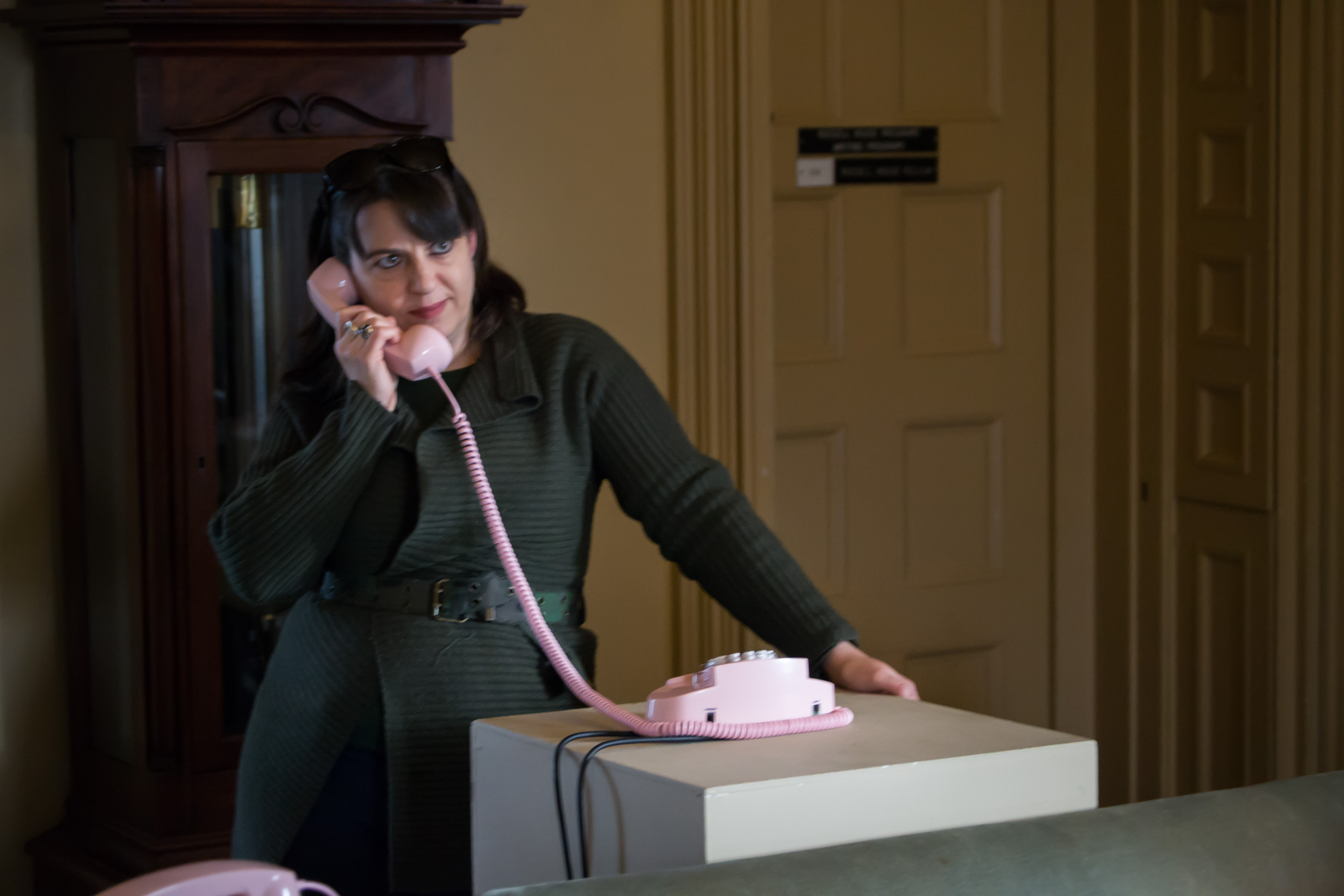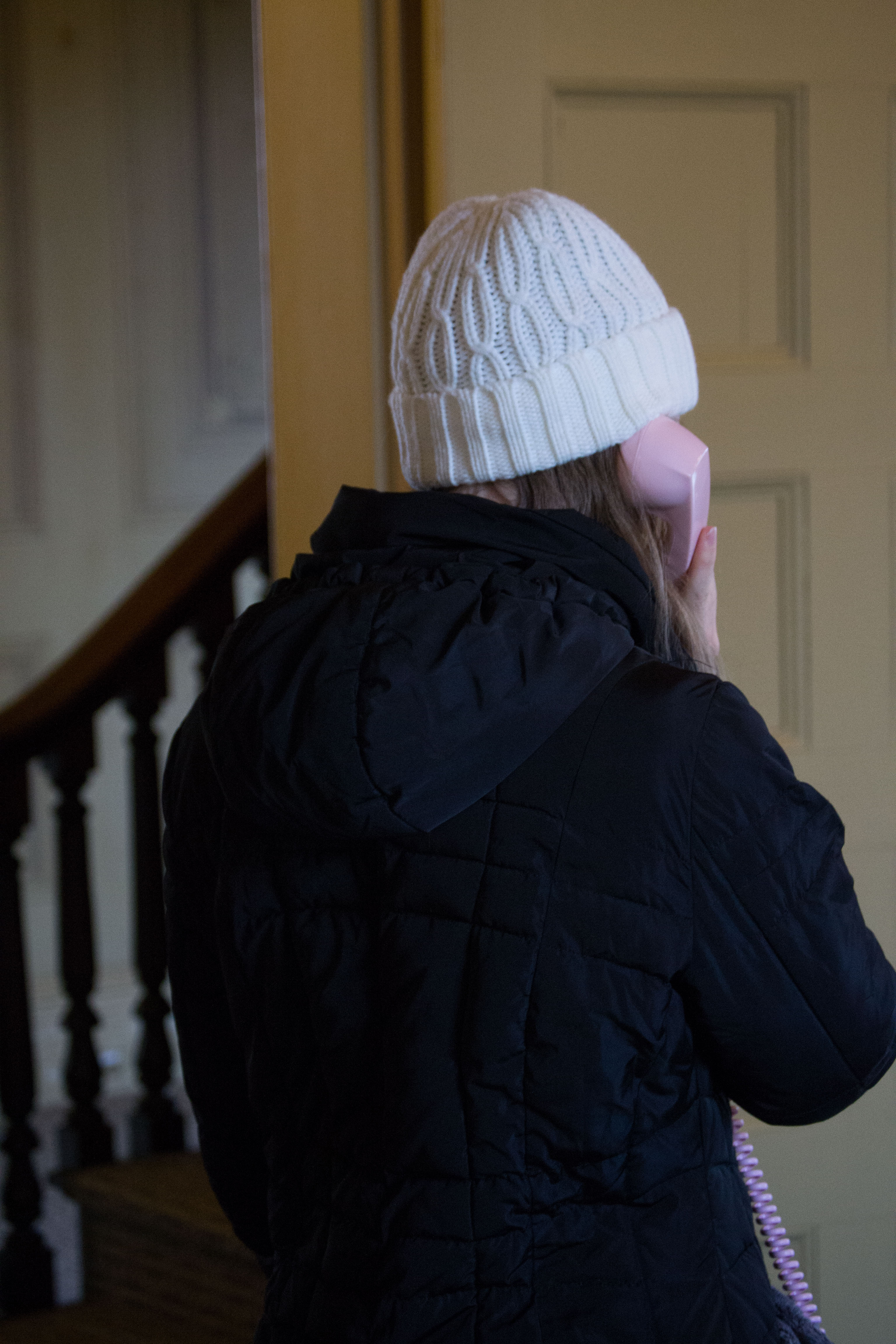
c/o William Halliday, Photo Editor
Walking into Russell House this past weekend was like entering the set of a vintage film. The usual paintings, pendulum clock, and faded carpets were accompanied by fifteen baby pink rotary phones, strategically placed around the room on surfaces of varying levels. Visitors sat or stood by some of the phones, listening intently to the receivers and periodically relocating to another phone in the two rooms where the devices were dispersed.
These audience members were, shockingly, listening to thirty-minute loops of on-hold music, interspersed by various generic messages of encouragement to “stay on the line” and assurances that they were “the next caller.”
Flitting around the room amongst the visitors, periodically stopping at telephones to listen in, or dashing over to an expansive soundboard in the entryway of the house, was Anthony Dean ’17, in all his big-haired glory, whose thesis project, titled “Resistentialism,” had resulted in this quietly mysterious, romantically mundane installation.
Dean, whose joint music and theater thesis takes on-hold music as its principal subject, had originally intended on studying contemporary vocal techniques in the band Room Full of Teeth, had his world turned upside down during a call with Roku last January, when he found himself thoroughly enjoying the company’s on-hold music while waiting for someone on the other end.
“I thought, ‘Hey, why don’t people talk about this music more?’” Dean recounts. “And then I realized I can talk about this music more. So I decided I was going to do my theater and music thesis studying the performance of on-hold music and how that really disembodies the music performance but also really personalizes it because you’re also the only one listening to it.”
It turns out that on-hold music specifically is not particularly easy to trace. Dean managed to find a couple composers of the music, such as Ronald Jenkees, who writes the music that all Google services play for their customers on hold (and who bears a bizarrely similar name to a certain Theater professor here at Wesleyan).

c/o William Halliday, Photo Editor
Dean also drew on research that had been done on other sorts of ambient soundtracks, starting with a book on elevator music and also looking into tunes that fill lobbies, waiting rooms, and the like. Much of this music was originally provided by the company Muzak, which turned up in the 1950s when consumers gained the ability to order products on the phone and often spent time waiting for a sales representative. (The word “muzak” has now become synonymous with the actual category of music category of music that plays in these contexts.) The retro quality of the phones is also inspired by this history, harkening back to the era to which this music’s origins can be traced.
The main research, however, simply consisted of hours upon hours of waiting on hold, noting the genres present in each company’s recordings, listening to the various minuscule differences in the messages that were voiced between tracks, and even asking, when the waiting period would end and a voice would appear on the other line, to be put back on hold in order to hear more of the music.
“The more I dive into this research, the more I keep finding,” Dean gushes. “There are so many things that relate back to this, how music exists as an art form, but also in this, which is a commercial and capitalist tool. How it hops into everyday life outside of traditional performance venues.”
After the wide range of research he conducted into music’s various applications in everyday life, Dean still finds that on-hold music holds a very unique nuance. Of course, his all-time favorite is the original Roku track that inspired the project, but he also names Washington Street’s CVS and its piano tracks as a highlight.
“It’s so lovely how awful it is,” he laughs. “I don’t know, there’s something that’s very haunting about that.”
Finally, this intensive investigation into the subtleties and shadings of on-hold music led Dean to write some of his own. More than some, actually—he has produced over fifteen tracks, which play on half-hour loops on the phones. The pieces range from acoustic versions of soft pop hits like “Take on Me” to classical piano accompanied by the slight crack and fuzz that tends to give on-hold music that particular…charm, according to Dean.
Although his goal is ultimately to recontextualize or reclaim on-hold music, Dean has no lofty pretensions about his work. In fact, the word he uses most when describing it tends to be “silly.” He’s spliced in little pieces of his own humor, from a cameo by a pseudo-celebrity who stars in the podcast “Welcome to Night Vale” to quirky remix-esque manipulations of the voices in between the music. At five minutes and fifteen seconds, prompts come through all the phones that lead listeners to say “yes” into the phone with the hopeful result that everyone in the room utters the word simultaneously. While the project is based on the concept of on-hold music, there’s a playful twist, a joke between artist and audience, that almost parodies the project’s very subject.
“It’s very reminiscent of the music you’ll hear on hold, but it’s not,” Dean clarifies. “It’s distinctly different. You’ll hear my idea of humor within it. I don’t want it to be a flashy experience because music on hold is not a flashy experience. It is just a very subtle piece of life in modern society.”
If you missed Dean’s piece, you can hear a brief snippet of it by calling in the same number that Dean set up for visitors to make “reservations” at the installation (which, in reality, were not necessary to enter): 860-685-2950.
“So much of the time I find that the aggression or disdain for on-hold music is the context that you’re in,” Dean says. “Here, you actually listen to the music like I’ve been doing for the last year, and you actually appreciate what you’re hearing. If people, when they’re on hold in the future, think back to this performance…think, ‘Oh, this music is actually doing something, not just keeping me from who I want to be talking to or what I want to get out of this phone call,’ that’s the goal.”
Comments are closed